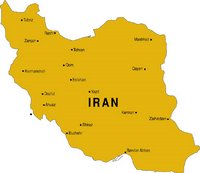Iran: Can You Blame Them for Wanting Nukes?
My parents came to the United States in the mid-‘70s as students. They had every intention to return to Iraq, but the Iraq-Iran war broke out in late 1980 and they stayed in the US after being threatened by Saddam’s regime.
 Iran: A Brief History
Iran: A Brief HistoryIn 1979, after years of political unrest, Iranians stood up against their government and overthrew Western-installed Shah Mohammad Reza Pahlavi. Apparently, the U.S. was not impressed that their guy had been removed from power and Iran has since been hated by the West. To try to destabilize the new government, Saddam’s Iraq was encouraged to invade Iran with the help of some neighboring Arab countries and Western allies. So began the Iraq-Iran War in September 22, 1980.
The war lasted a long time – too long. It cost a million lives on both sides and over USD$1 trillion. Having underestimating Iran’s military might and afraid of loosing, Saddam offered to cease hostilities after two years of war. Iran, however, insisted that Saddam was an evil dictator and must be removed from power – dragging the war on for another six years.
Iraq WMD: We have the receipts
Desperate for a way to win, Saddam resorted to using his infamous Weapons of Mass Destructions or WMDs – killing thousands of Iranians (and sometimes his own troops). Where he got those WMDs is still not 100% clear, but it is reasonable to assume that it was his allies – the ones who pushed him to invade Iran to begin with and had much to loose if Iran succeeded in overtaking Saddam. Shortly after the 2003 Coalition invasion of Iraq, there was a sour joke in the U.S.:
"Of course we know the Iraqis have weapons of mass destruction. We have the receipts."
 Missle Envy
Missle EnvyEverywhere Iran looks, it sees other countries with nuclear weapons. To the east, you have Pakistan and India – neither of which have signed the Nuclear Non-Proliferation Treaty (NPT). And to the west, you have Israel.
Iran hates Israel because it views the Jewish state as an unjust one. Iranians do not hate Jews – quite the contrary, Jews in Iran are treated with respect and enjoy living in Iran. When it comes to Israel, however, Iranians believe that Israelis stole land from the Palestinians – leaving them landless, helpless, and oppressed. Iranians feel that they must stand up against Zionism because of Palestinian suffering and because it threatens to destroy one of Islam’s holiest mosques in Jerusalem. I am sure there are other reasons.
Defend Whom Against Whom
Israel is a major nuclear power - yet has refused to sign the NPT. The West is worried that Iran will be a threat to Israel if it attains nukes. From an Iranian standpoint, however, it is Israel that has a history of aggression and land-grabbing – and they even have nuclear weapons. Where it stands right now, Israel is a much bigger threat to Iran than vice-versa.
Nukes are BAD – Period!
Nuclear weapons are evil by their very nature – they can do nothing but mass destruction. Ideally, nobody should have them. Reality is far from ideal, however, and as long as opposing countries each have nukes, we can only hope that it will keep either side from using them.
Iran is still struggling to improve its status as a world power. The current generation of Iranian leaders has strayed from the original vision of the Revolution and have started alienating its own people. They believe that achieving nuclear status will improve their influence and power.
Captain's Thoughts
Iran should concentrate on improving conditions in its own country - Western hostilities are not helping much (maybe that's the point). I say Iran should abandon their nuclear ambitions and prove its prestige by some other means – something less controversial - maybe a space program.




2 Comments:
i hope US (legal terroris) not attack with weapon or economic power, iraq is enought :)
I really enjoyed how you went into the history of Iran. I do think that there is something going on with Iran and the US. When they were trying to get oil from the Caspian sea, they had to bypass Iran all together and go through countries like Afganistan. Why was that the case? Was Iran against it, or was the US careful to not rock the boat politically. My grandgrandfather is Iranian, so a part of me is hoping for the country to develop.
Post a Comment
<< Home